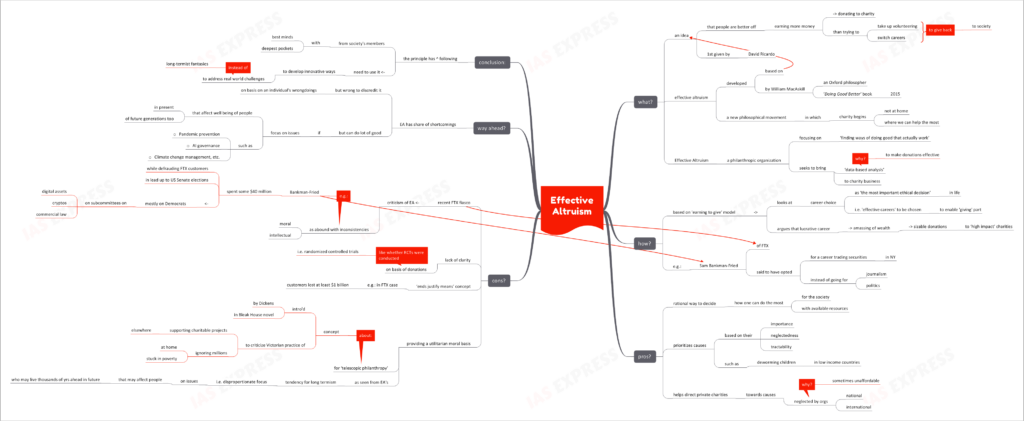Effective Altruism- Meaning & Effectiveness

From Current Affairs Notes for UPSC » Editorials & In-depths » This topic
IAS EXPRESS Vs UPSC Prelims 2024: 85+ questions reflected
The philosophy of effective altruism has been in spotlight after one of its key proponents, Sam Bankman-Fried, recently saw his cryptocurrency trading firm FTX go bankrupt. It has also been discovered that it was giving loans to Alameda, its sister foundation, from the deposits made by the exchange’s customers.

What is effective altruism?
- The idea that people are better off earning more money and donating a portion of it to others who are better at social work, than trying to take up volunteering or switching careers to ‘give back’ to the society, was 1st propounded by David Ricardo.
- Over the decades, the idea formed the basis for effective altruism, a new philosophical movement, started by William MacAskill, an Oxford philosopher who detailed the concept in his 2015 book, ‘Doing Good Better’.
- In effective altruism (EA), charity begins, not at home, but ‘where we can help the most’.
- Effective Altruism or EA is now a philanthropic organization focusing on ‘finding ways of doing good that actually work’. The EA community seeks to bring ‘data-based analysis’ to the charity business, to make donations as effective as possible.
How does it work?
- EA works on the basis of an ‘earning to give’ model. In line with this, the philosophy looks at career choice as ‘the most important ethical decision’ in life.
- This means that ‘effective’ careers are chosen to enable the ‘giving’ part. The philosophy argues that a lucrative career would help amass wealth, which would in turn enable sizable contributions to ‘high impact’ charities.
- For instance, Sam Bankman-Fried is said to have opted for a career trading securities in New York, instead of going for journalism or politics, for fulfilling his aspirations of ‘giving back’ to the society.
What are the pros?
- EA is considered a rational way to decide how one can do the most for the society, with the available resources.
- The philosophy prioritizes causes based on their importance, neglectedness and tractability. For instance, the EA community have been contributing to deworming children in low income countries.
- It helps direct private charities towards causes that are neglected by national and international establishments, sometimes because of unaffordability.
What are the cons?
- The recent FTX fiasco has led to criticism of EA as abound with moral and intellectual inconsistencies. For instance, Bankman-Fried is reported to have spent some $40 million, while defrauding FTX customers, in the lead up to the recent US Senate elections. Most of it went to Democrats on subcommittees on digital assets, cryptos and commercial law.
- Critics have also pointed to the lack of clarity on what forms the basis of EA donations. There have been questions on whether RCT/ randomized controlled trials were undertaken in line with the philosophy.
- There is a concern that EA’s ideas border on the ‘ends justify means’ concept. For eg, it is reported that FTX customers lost at least $1 billion.
- The concept of effective altruism, through its use of scientific vocabulary and tools like probability estimates, is criticized as providing a utilitarian moral basis for ‘telescopic philanthropy’, a concept denounced by Dickens in his ‘Bleak House’ novel.
- Telescopic philanthropy was used by the novelist to criticize the Victorian practice of supporting charitable projects elsewhere, while ignoring the millions stuck in poverty back home.
- For instance, EA has a tendency for long termism i.e. disproportionate focus on issues that may affect people who may live thousands of years ahead in the future.
What is the way ahead?
- While effective altruism has its share of shortcomings, it would be wrong to discredit the principle based on the wrongdoings of an individual, though very visible, proponent.
- The principle can do a lot of good by focusing on issues that affect the well-being of the current population as well as the future generations, such as:
- Pandemic prevention
- AI governance
- Climate change management, etc.
Conclusion:
Given the following the principle commands from society’s members with the best minds and deepest pockets, using it to develop innovative ways to address real world challenges, instead of long-termist fantasies, could result in actual benefits.
Practice Question for Mains:
What is effective altruism? Discuss its pros and cons. (250 words)
If you like this post, please share your feedback in the comments section below so that we will upload more posts like this.

